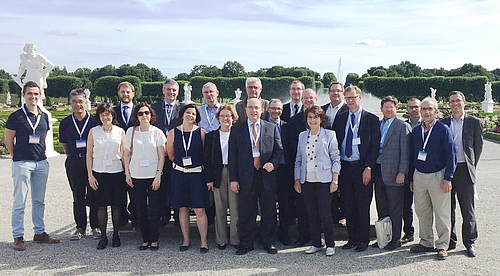A panel of experts develops a consensus-based statement on exacerbations in patients with bronchiectasis
In July 2016, international bronchiectasis experts met at the First World Bronchiectasis Conference in Hannover, to develop a consensus statement on the definition of exacerbations in patients with bronchiectasis not caused by cystic fibrosis. Prior to the meeting, a so-called Delphi process was used, in which the experts had collected criteria for the definition and rated them online, without being influenced by one another.
Professor Dr. Tobias Welte, Head of the Clinic of Pneumology at Hannover Medical School (MHH) and Director of the Hannover site (BREATH) of the German Center for Lung Research, and Dr. Felix Ringshausen, Senior Physician at the MHH, experts for bronchiectasis and Board Member of the German Bronchiectasis Register PROGNOSIS, both took part in this process and were also hosts of the meeting in Hannover. „Here we reached a unanimous verdict on the criteria defining an exacerbation“, explained Dr. Ringshausen. „When at least three or more of the established symptoms deteriorate over a period of more than 48 hours, and the doctor decides that changes should be made in the treatment, we would define this as an exacerbation“ explained Dr. Ringshausen. The symptoms selected by the experts are coughing, increase in volume of sputum and/or its consistency, increase in sputum purulence, (increase in) breathlessness (on exertion), fatigue and/or general malaise and coughing up blood (hemoptysis).
This definition was drawn up by international experts from the European Bronchiectasis Register EMBARC, representatives from the US Bronchiectasis Register, together with representatives from Australia, New Zealand and South Africa. In their consensus paper, published in June 2017, they recommend that this definition is used in future clinical studies for patients with bronchiectasis.
„We are very proud that we have been able to offer here, at the First World Bronchiectasis Conference in Hannover, the setting for the decision on this important definition“, said Professor Welte. „And our patients will benefit from it when uniform criteria for an exacerbation are used in future studies. This will make the results from the studies comparable and thus be used more effectively to identify the best therapy“.
A discussion on the determination of both the selected and non-selected criteria for the definition together with a detailed depiction of the Delphi process can be found in the original publication.
Publikation:
Hill AT, Haworth CS, Aliberti S, Barker A, Blasi F, Boersma W, Chalmers JD, De Soyza A, Dimakou K, Elborn JS, Feldman C, Flume P, Goeminne PC, Loebinger MR, Menendez R, Morgan L, Murris M, Polverino E, Quittner A, Ringshausen FC, Tino G, Torres A, Vendrell M, Welte T, Wilson R, Wong C, O'Donnell A, Aksamit T; EMBARC/BRR definitions working group. Pulmonary exacerbation in adults with bronchiectasis: a consensus definition for clinical research. Eur Respir J. 2017, Jun 8;49(6). pii: 1700051. doi: 10.1183/13993003.00051-2017. Print 2017 Jun. PubMed PMID: 28596426.
Text and Picture: BREATH/AZ


Experts for Bronchiectasis met at Schloss Herrenhausen in Hannover